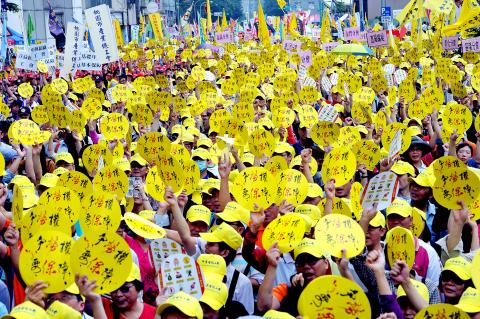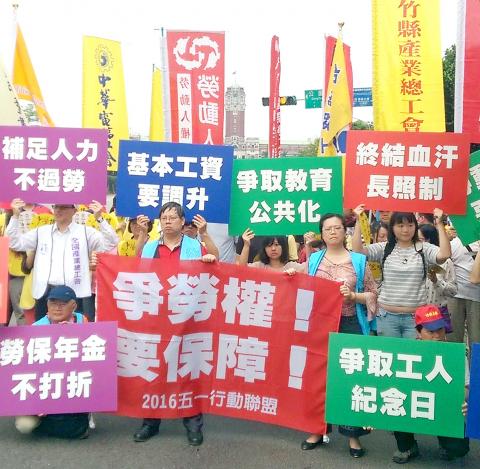Thousands of people yesterday took to the streets of Taipei to mark Workers’ Day, demanding that the government protect workers’ rights, while criticizing the incoming Democratic Progressive Party (DPP) administration’s plans to continue labor policies that the protesters said have worsened working conditions.
The “Fight for Workers’ Rights and Protection” march was joined by an estimated 15,000 protesters, organizers said, starting in front of DPP headquarters and moving to the Legislative Yuan and Ketagalan Boulevard.
Marchers set off firecrackers in front of the Presidential Office Building in a symbolic gesture to “declare war” on the government, saying there would be no honeymoon period for the new Cabinet, calling on it to immediately address labor issues that they said were born of pro-business policies.

Photo: Huang Pang-ping, Taipei Times
Unions issued nine demands: reduced working hours and designated national holidays for workers; no reduction of pensions; an end to atypical employment; a minimum-wage increase; protection of workers’ rights to set up unions, negotiate with employers and organize strikes; address understaffing and overwork issues; an improved public long-term care system; prohibition of mergers between private and public banks to protect public assets; and nationalized education.
“We are at the DPP headquarters today because [president-elect] Tsai Ing-wen’s (蔡英文) policies regarding workers’ rights and social welfare are obscure, and her policies could be a continuance of current rules, which have led to loose labor practices,” Hsinchu Confederation of Trade Unions director Chan Su-chen (詹素貞) said.
“Demands put forward by workers’ unions have been consistent over the past 10 years, because administrations, including those of former president Chen Shui-bian (陳水扁) and President Ma Ying-jeou (馬英九), as well as Tsai’s incoming team, have been or will be attempting to enact contract employment regulations, which would only legalize and increase atypical employment and poverty,” Tainan Confederation of Trade Unions secretary-general Huang Yu-te (黃育德) said.

Photo: Huang Pang-ping, Taipei Times
“The government should investigate contract worker rates and the need for contract employment in a businesses, while the government should phase out contract employment and help contract workers become regular employees,” Taiwan Confederation of Trade Unions director-general Chuang Chueh-an (莊爵安) said.
Chuang said Tsai pledged to establish a minimum-wage law while on the campaign trail, but the former DPP administration only raised the minimum wage once in Chen’s eight-year presidency.
Tsai should immediately increase the minimum wage when she takes office, instead of delaying the move with a prolonged legislation process, Chuang said.
Tsai promised to visit people from all walks of life if she won, but she never visited workers’ groups, Chuang said, urging Tsai to do so and put a stop to the Ministry of Labor’s plan to reduce the number of national holidays by seven.
“All pension reform proposals put forward by different administrations have aimed to extend the retirement age and ask workers to pay more but receive less in pensions, which we do not accept because the so-called reforms are made at the expense of workers. The government should tax large businesses to fund pensions,” he said.
There are 800,000 people with chronic illness or disability who need long-term care, but only about 10 percent of them are covered by the government system, while 90 percent are taken care of by their families or migrant workers, which amounts to the government shifting social responsibility to the public, the groups said.
Tsai’s policy to expand public long-term care is to be financed by tax revenue, but the proposed budget, NT$40 billion (US$1.24 billion), is barely enough, while the DPP has failed to clarify key issues, including where to recruit carers and how to improve their working conditions, the groups said.
Seperately, Tsai posted a photograph on Facebook reiterating her labor policies, which include raising wages; reducing working hours; protecting atypical workers; supporting employment of young, middle-aged and elderly people; giving special care to people involved in workplace accidents; and encouraging unions.

MAKING WAVES: China’s maritime militia could become a nontraditional threat in war, clogging up shipping lanes to prevent US or Japanese intervention, a report said About 1,900 Chinese ships flying flags of convenience and fishing vessels that participated in China’s military exercises around Taiwan last month and in January last year have been listed for monitoring, Coast Guard Administration (CGA) Deputy Director-General Hsieh Ching-chin (謝慶欽) said yesterday. Following amendments to the Commercial Port Act (商港法) and the Law of Ships (船舶法) last month, the CGA can designate possible berthing areas or deny ports of call for vessels suspected of loitering around areas where undersea cables can be accessed, Oceans Affairs Council Minister Kuan Bi-ling (管碧玲) said. The list of suspected ships, originally 300, had risen to about

DAREDEVIL: Honnold said it had always been a dream of his to climb Taipei 101, while a Netflix producer said the skyscraper was ‘a real icon of this country’ US climber Alex Honnold yesterday took on Taiwan’s tallest building, becoming the first person to scale Taipei 101 without a rope, harness or safety net. Hundreds of spectators gathered at the base of the 101-story skyscraper to watch Honnold, 40, embark on his daredevil feat, which was also broadcast live on Netflix. Dressed in a red T-shirt and yellow custom-made climbing shoes, Honnold swiftly moved up the southeast face of the glass and steel building. At one point, he stepped onto a platform midway up to wave down at fans and onlookers who were taking photos. People watching from inside

Japan’s strategic alliance with the US would collapse if Tokyo were to turn away from a conflict in Taiwan, Japanese Prime Minister Sanae Takaichi said yesterday, but distanced herself from previous comments that suggested a possible military response in such an event. Takaichi expressed her latest views on a nationally broadcast TV program late on Monday, where an opposition party leader criticized her for igniting tensions with China with the earlier remarks. Ties between Japan and China have sunk to the worst level in years after Takaichi said in November that a hypothetical Chinese attack on Taiwan could bring about a Japanese

STREAMLINED: The dedicated funding would allow the US to transfer equipment to Taiwan when needed and order upgraded replacements for stockpiles, a source said The US House of Representatives on Thursday passed a defense appropriations bill totaling US$838.7 billion, of which US$1 billion is to be allocated to reinforcing security cooperation with Taiwan and US$150 million to replace defense articles provided to the nation. These are part of the Consolidated Appropriation Act, which the US House yesterday passed with 341 votes in favor and 88 against. The act must be passed by the US Senate before Friday next week to avoid another government shutdown. The US House Committee on Appropriations on Monday unveiled the act, saying that it allocates US$1 billion for the Taiwan Security Cooperation Initiative